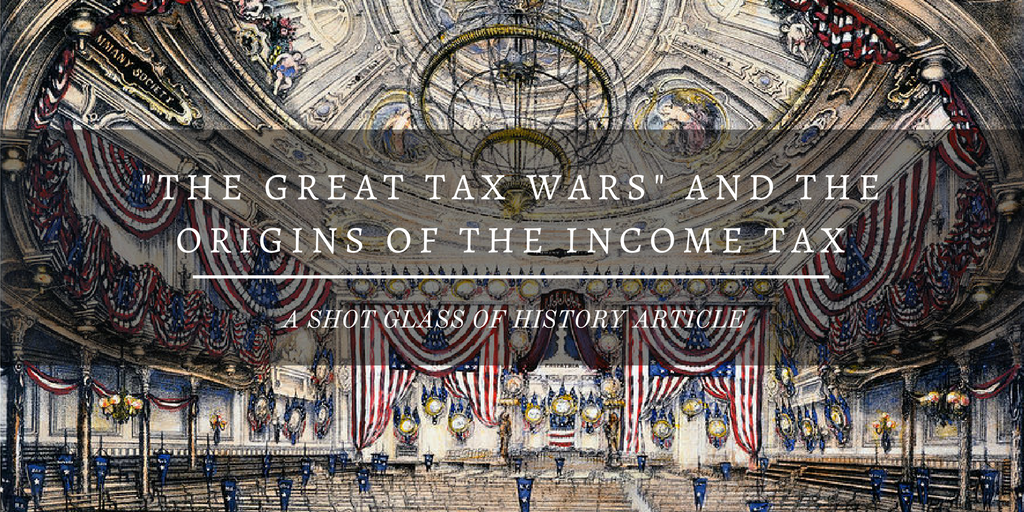The Great Tax Wars: Lincoln-Teddy Roosevelt-Wilson How the Income Tax Transformed America
BY STEVEN R. WEISMAN
SIMON & SCHUSTER, 432 PAGES, $25.99
–
Wars naturally consolidate and centralize government, leading to a greater flow of wealth to those in power. And as Steven Weisman details in his book, The Great Tax Wars, that new flow of consolidated wealth generally arises from the need to pay for those wars in the first place. Weisman’s book covers the heated political tug of war from Lincoln’s administration to Wilson’s, as America’s political parties sought to gain control of the wealth of a nation through the income tax.
The income tax is generally taken for granted today as a necessary tool of modern statecraft, but this has not always been the case. Then as now, the arguments surrounding the income tax involve issues of social justice concerning wealth.
It has been an especially appealing tax for those who tend to see wealth as a product of good luck, exploitation of others, political favouritism and predatory conduct toward rivals. It has been an objectionable tax for those who tend to see wealth as the logical reward for hard work, thrift, ingenuity and other admirable forms of behavior. (Weisman, The Great Tax Wars, p. 350)
The former main source of federal income, the tariff, while directly taxing foreign imports, indirectly raised the price of most consumer goods, causing the poor to carry the brunt of the tax. Thus the income tax was seen by its proponents as a more just form of taxation, taxing people according to their ability to pay.
However, Weisman is quick to remind us that the definition of politics is, as Ambrose Bierce put it: “A strife of interests masquerading as a contest of principles. The conduct of public affairs for private advantage.” And the government, while claiming to be a public institution, has its own expenses, the largest of which is war.
 With the U.S. penniless eight months into the Civil War, which would eventually reach costs upwards of two million dollars a day (p. 50), officials in the U.S. government quickly realized that a more lucrative form of Federal taxation than tariffs was required. From this need emerged the nation’s first progressive income tax, which remained in effect until its expiration in 1871. By this time the United States had burst from its shell of agrarianism into a fully fledged industrialized society, bringing with it moral issues of growing wealth and prosperity.
With the U.S. penniless eight months into the Civil War, which would eventually reach costs upwards of two million dollars a day (p. 50), officials in the U.S. government quickly realized that a more lucrative form of Federal taxation than tariffs was required. From this need emerged the nation’s first progressive income tax, which remained in effect until its expiration in 1871. By this time the United States had burst from its shell of agrarianism into a fully fledged industrialized society, bringing with it moral issues of growing wealth and prosperity.
While the concerns of social justice and the legality of the income tax were at the forefront of the debate, proponents and opponents were drawn up along pre-Civil War party lines. The Republicans traditionally had backed a high tariff to protect northern manufacturing, which came at the expense of southern agrarianism. Southern Democrats thus had vehemently opposed the protectionist tariff, calling it the “Tariff of Abominations,” and it had very nearly brought the country to civil war in the 1830’s. So it is not surprising that in the post-Civil War contest over the means of taxation, the Democrats backed the income tax, gaining further support from the poorer parts of the nation who also suffered under high tariffs.
Following the Civil War, Republican corruption allowed the Democrats to slowly regain control of the national government, making possible in 1895 a new proposal for the graduated income tax. Using popular sentiment against elitist corruption, they managed to get the bill passed, but only to see it shut down as unconstitutional by the Supreme Court. Due to the failure of the income tax bill and a dipping national economy, the Democrat party began to lose its hold, and ditched their old party positions in favour of a Populist platform, spearheaded by William Jennings Bryan.
The Populist split of the Democrat party allowed the Republicans to regain power, until they in turn were divided by the rise of the Progressive party, led by presidential nominee, Teddy Roosevelt. With the new fluidity of party platforms, and the rise of the industrial barons, bipartisan political platforms became less important than financial backers. In the presidential campaign that preceded the eventual ratification of the income tax in 1913, all four nominees for the presidency, Populist Democrat, Progressive, Republican, and Socialist, vied with each other for the title of champion of the income tax.
The presidency went to Democrat nominee, Woodrow Wilson, who brought with him the greatest social legislation program ever attempted in America until his time. His goal, as he put it, was to create a system whereby “the ruling class of America would use Hamiltonian means of a strong central government to bring about Jeffersonian ideals of egalitarianism” (p. 268). After ditching the tariff as the source of federal revenue, Wilson eagerly turned to the progressive income tax as a means to shore up federal finances and to “overthrow the dominance of privilege vested since the Civil War” (p. 273). However, despite the high-mindedness of this sentiment, in “a cautious step to avoid another potential constitutional problem” the new income tax did not include the salaries of “state and local government officials and federal office-holders, including the President and federal judges, as well as the interest on state and local bonds” (p. 276).
As WWI broke out across Europe and trade with the beleaguered countries ground to a halt, the American government changed its absolute neutrality stance, and legalized exporting military goods to the French and British, which gave the American economy a new breath of life. However, the wealth that began pouring into the country was quickly gobbled up by the government through the ever-increasing income tax, which was then used to purchase war material that were exported to Europe. As Cordell Hull noted, “The income tax-law had been enacted in the nick of time for the demands of the war” (p. 305). Ironically, the income tax provided the U.S. Government with the money to purchase war materials from the very corporations that social justice theorists claimed would be restricted by progressive taxation, such as U.S. Steel and Standard Oil. The government also used the tax money to finance the massive loans being made out to Britain and France, and even got lower-taxed Americans involved by encouraging them to buy war bonds, which the government then paid back through the money collected in the income tax (p. 323). The entire American war racket was a circle of exploitation and wealth monopolization in the hands of the government and their financiers.
It is seriously doubtful that Americans would have embraced the income tax without the threat of WWI. And it is impossible that the U.S. government could have successfully financed the war like it did without the revenue from the resulting tax hikes. In fact, “more money was being raised for the war in Europe than had been spent by the federal government in all the years since 1791” (p. 329). However, unlike previous war taxes, this time the new tax structure was here to stay. Paying income taxes became a point of patriotic pride; in WWII the Treasury Department hired Irving Berlin to write a jingoistic song called “I Paid My Income Tax Today” (p. 354).
Prior to WWI the legitimacy of the income tax was a subject of great debate, today it is an assumed part of American life. But it has long since metastasized into something far larger than its first proponents would have ever dreamed. As Weisman notes at the end of his book,
. . . war unleashed the American willingness to use the tax system for aggressive social as well as economic ends. Once it was possible to see a great revenue engine financing a gigantic conflict, taxing the wealthiest Americans at high rates, it was more possible to contemplate such an engine supporting a welfare state. (p. 346)
The fruits of this new system would finally be realized in the 1930’s under FDR and his New Deal Program, which would eventually spawn further massive government social programs such as Social Security and Medicare, all in the name of protecting the weakest of society. However, with the tax system now financing the giant American warfare and welfare state, we should turn again to Ambrose Bierce’s definition of politics, and ask who in power is benefitting from these supposed social programs?






Koch Brothers-financed, biased pseudo-history. The essay intersperses major logical fallacies in a suave manner (including false equivalencies, presentism, etc). Of particular concern is the comprehensive failure to raise by direct, applicable comparison, the contemporary German counter example (see “Iron and Gold: Bismarck and His Banker Bleichhroder”), which appears to demonstrate a successful introduction of another aspirinig superpower in Germany. Under this counter example, Germany’s Bismarck and his successor introduced taxation policies that funded both a massive military increase and the first modern (and successful) government domestic old age social welfare program at the same time (starting two decades earlier from the U.S. in the 1880s). Seems like an overly “convenient” omission that also completely undermines the essay’s argument above, no?
The thesis of the article was to examine the chicken and egg relationship between war and taxation (specifically the U.S. income tax), and how the the one often gives birth to the other. Since Fritz Stern’s work does not undermine this argument in any way, but in fact supports it, I’m going to guess that you’ve either not read Stern’s book, or you didn’t read the article.